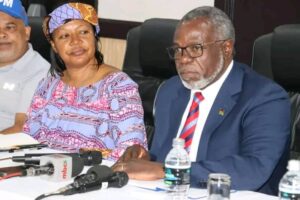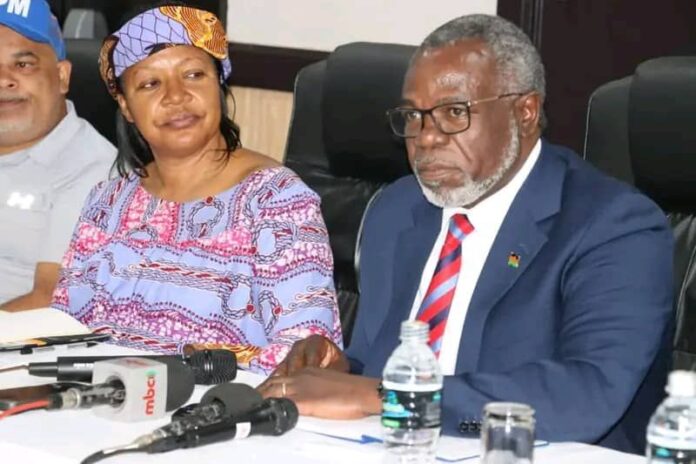By Burnett Munthali
The Democratic Progressive Party (DPP) has taken a firm stance that there will be no amnesty for individuals who have stolen public funds.
The announcement signals the party’s intent to restore accountability and trust in public institutions that have long been plagued by corruption.
The DPP leadership has emphasized that anyone found guilty of embezzling or misappropriating state resources will face the full force of the law.
This decision comes at a time when Malawians continue to grapple with economic hardship worsened by years of financial mismanagement and corruption scandals.
Party officials argue that granting amnesty would only encourage impunity and undermine the rule of law.

They further stress that justice must not be selective and that all offenders, regardless of political or social status, must be held accountable.
The declaration is also viewed as a direct response to ongoing public outcry demanding stricter measures against those responsible for draining government coffers.
Observers believe that this position could strengthen the DPP’s credibility as it prepares for the next elections, where governance and accountability remain hot campaign issues.
The stance is particularly strategic because corruption has emerged as one of the most decisive factors influencing voter sentiment ahead of the 2025 elections.
By rejecting any notion of amnesty, the DPP seeks to position itself as the party of accountability in contrast to the ruling administration, which has been criticized for tolerating or failing to curb financial mismanagement.
The Malawi Congress Party (MCP), under President Lazarus Chakwera, has faced growing discontent over its handling of corruption cases, with critics pointing to a lack of decisive action and selective application of justice.
While the MCP came to power in 2020 promising a “new Malawi” founded on transparency and accountability, its track record has been blemished by high-profile scandals and weak enforcement of anti-corruption pledges.
Several reports of fraudulent contracts, abuse of public resources, and questionable procurement deals have surfaced under the MCP government, undermining its claim of being a clean administration.
For many voters, the MCP’s inability or unwillingness to prosecute allies and associates implicated in corruption has raised concerns that the party has failed to match its promises with action.
The DPP is therefore seizing an opportunity to reframe itself as the party capable of enforcing discipline and accountability, despite its own controversial history in government.
This creates an opportunity for the DPP to rebrand itself as a party that has learned from past mistakes and is now committed to a clean and transparent government.
Critics, however, caution that the DPP must prove it is not exploiting the corruption issue merely for political mileage, given its own chequered record of financial scandals during previous regimes.
Skeptical voters may recall that both the DPP and MCP have in different ways struggled to translate anti-corruption rhetoric into meaningful reform.
Nevertheless, the zero-amnesty stance resonates strongly with an electorate frustrated by rising poverty, stalled development, and recurring corruption scandals.
For many Malawians, the statement offers a glimmer of hope that the cycle of looting and impunity that has crippled development might finally be broken.
Analysts argue that if the DPP manages to frame its message as a practical plan—complete with strategies for asset recovery, judicial independence, and transparent prosecutions—it could sway undecided voters and weaken the ruling party’s narrative.
This policy position could also put pressure on the MCP and other competitors to clarify their own anti-corruption agendas, thereby setting the tone for election debates.
The DPP has promised to pursue all available legal avenues to recover stolen funds and ensure that culprits are prosecuted without fear or favor.
This bold stance, if implemented consistently, could mark a turning point in Malawi’s fight against corruption and reshape the political landscape leading into 2025.
In the end, whether this strategy translates into electoral success will depend not only on the DPP’s messaging but also on its ability to convince Malawians that its promise of zero amnesty is more than just a campaign slogan.
Urban voters, especially professionals and business owners, are likely to be drawn to the DPP’s stance because they are directly affected by weak governance, unstable markets, and the loss of investor confidence caused by corruption.
Rural voters, who have often borne the brunt of underfunded health, education, and agricultural services, may also welcome the message if they are convinced that recovered resources will be reinvested into development projects.
The youth, representing the largest voter bloc, could be particularly responsive to the anti-corruption message, as unemployment and lack of opportunities are often linked to the misuse of public resources.
Older voters, many of whom value stability and have lived through cycles of unfulfilled promises, may be more cautious but could still shift toward the DPP if they believe the party is genuinely prepared to deliver justice and restore order.
By appealing simultaneously to urban frustration, rural disillusionment, youthful anger, and older skepticism, the DPP’s “zero amnesty” stance has the potential to cut across multiple constituencies and reshape the electoral map in 2025.



